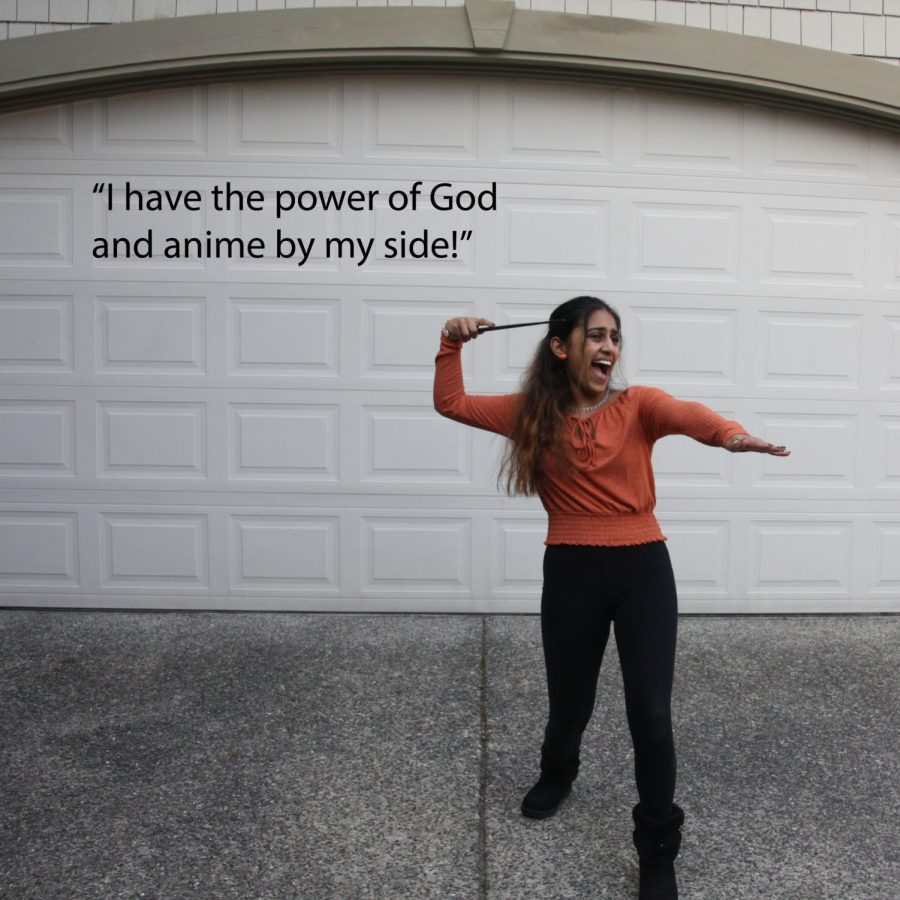The Absurd World of Memes and Generation Z
MEME-ING OF LIFE Sophomore Naina Shankar reenacts a popular online meme. The picture may confuse some, but to the majority of Generation Z, the inside joke is clearly understood.
November 1, 2019
World War III is coming, climate change is going to kill us all, and any hope for a benevolent society has been abandoned. These are the laments of a generation caught in a world that is falling apart at the seams. In response, they have created a culture where, if the question is a somber issue, the answer is always memes.
Generation Z is the name attributed to the generation born between 1995 to 2010, which contains current university students, secondary school students, and children in their late elementary school years. They are mostly the children of Generation X, who grew up primarily in the eighties and only received modern technology in their high school or university years. In a far stretch from the humor of their parents, Millennials and Generation Z have created a unique, often disturbing culture of dark, absurd, politically and socially-fuelled digital humor.
Most are oblivious to it, but Millennials and Generation Z have become the harbingers of the revival of dadaism. Dadaism, an art movement beginning in Zurich, Switzerland, post-World War I, caused soldiers and civilians alike to rethink the glory and honor associated with battle. Many concluded that the horrors of war were unnecessary and irrational, and in turn, began to create absurd art and literature that contradicted traditional values by being, in itself, irrational and nonsensical.
To achieve peak Generation Z humor, simply take dadaism, mix in a sense of inevitable doom, add a pinch of jokes about the meaninglessness of existence, and there it is. However, this humor is far more complex than a handful of depressing vocabulary words.
A significant influencer of Generation Z’s humor is the world they have grown up in. Sophomore Naina Shankar said, “We’ve been brought up in different worlds. Older generations grew up with, ‘We’re going to become millionaires!’ and we grew up with, ‘I’d kind of like to go to college if I could maybe afford it.’ Basically, reality hit us like a big truck.”
Picture this: the world is on the edge of apocalyptic chaos, the only uncertainty being its cause. Humanity walks a fine line between destruction and salvation. Technology is thriving while the environment dies. Communication is instantaneous while emotional connect and mental resilience are at their lowest. Corporations are raking trillions while poverty runs rampant and the average person struggles to support themselves. Society is plagued with climate change, corruption, poverty, population crisis, the threat of nuclear warfare, terrorism, deteriorating mental health–the list goes on and on. Placed blunt and uncensored in words, one’s thoughts may be similar to junior Hawani Harper’s, who agreed to seeing the similarities between the circumstances of Generation Z and the moral slum post-World War I. “We share that feeling of, ‘We didn’t die, but it could happen at any moment so we might as well be ourselves.’ We’ve been beaten down by circumstance, and the future is uncertain… so… we cope with memes.”
The essence of Generation Z’s humor, memes are absurd digital images usually paired with captions. People reuse the pictures and add or remove objects from them or create a new caption to add their own take on the image, and this exchange takes place across the Internet.
Modern technology is both a root cause of Generation Z’s humor and its means of spreading. Freshman Gabe Dy put it best when he said, “When you’re a kid, you’re blocked off from the world and can still be happy, but online and with phones, [teenagers] can see memes and recognize the destruction of the world around them.” Every generation has its social issues, but none have been so openly exposed to them at a young age as Generation Z has. Mass media, the Internet, smartphones, and social media has surrounded Generation Z with easily accessible information so, from a young age, this generation has been swamped with the social issues they would otherwise have been shielded from. In the wake of this rapid information overload, Generation Z learned to use it to their advantage. As sophomore Noah Knost said, “The Internet spreads things quickly. Things that are happening turn into memes, even important issues like Greta [Thunberg’s call to climate activism] and 9/11. Memes make them less severe and are a way of coping.”
Another testament to this humor’s reliance on modern technology and the Internet is AP European History teacher Greg Harrington, who said, “People who don’t have regular contact with kids and high schoolers don’t know it’s a joke…. I understand some. Some, but not all. I think that if someone didn’t have a cellphone, they wouldn’t know either.” Generation Z’s humor is almost like an online, international inside joke between its members, and is difficult for other generations to understand. Senior Laney Orfanos said, “Other generations don’t get it. I show my mom memes, but she’s like, ‘What?’ Our generation is sarcastic and picks at what’s wrong with the world, but older generations are dad jokes and traditional jokes–kind of an obvious funny. Humor has shifted a lot.”
Although the humor of Generation Z may be dark and widely concerning at sometimes, it is through this that Generation Z expresses their knowledge of the world and its problems. Surprisingly, memes show how Generation Z are grounded in reality and are ready to work towards a future where the issues in their memes are non-existent.





Some Random Guy • Dec 25, 2021 at 5:18 am
Why is there only one picture of amazement in this article?